Letter from George to Ruth Mallory written from onboard ship on Anchor Line, T.M.S. California letter headed paper.
Full Transcript
My dearest Ruth,
We shall be at Port Said tomorrow and its time I were writing to you again. It is being a voyage particularly without incident, as we shall land only once, for a short time, before reaching Bombay. But one unforgettable thing has happened – the approach to Gibraltar. I was fortunate enough to wake before sunrise and went on deck. We were steaming due East and straight ahead was the orange glow streaming over the sky. Towards the centre of it the long dim lines of land on either converged and left a gap – quite a small gap between little lumps of land, for the straits were 20 miles away or more. We were aiming straight for this little hole in the skyline where the light was brightest, and I had to most irresistible feeling of a romantic world; we had only to pop through the hole like Alice through the garden door to reach a new scene or a whole kingdom of adventures.
The other important thing that has happened to me is that I have in some way strained my left hip in the gymnasium about 5 days ago. It gave me considerable pain for two days like sciatica, a pain in some important nerve all down the leg – the sciatic nerve I understand is in the back of the leg and this one was in the side. The leg is much better, though not yet well. I ran ten times round the deck this morning; but that doesn’t prove as much as you might think, because it is rather the lifting movements that are weak. However I have a fortnight, nearly, to Darjeeling and I’ve little doubt the hip will be all right by then.
I have finished reading Maurois’ Ariel [Andre Maurois’ Life of Shelly or Ariel] with much interest. I knew the early life in Hogg and the last scenes in Trelawney’s Recollections which I think you have read, a charming book, but I have never before read a connected account of the whole life. Shelley certainly had an extraordinary gift of love, and love of a very pure and sublimated kind. Maurois makes out that he had lost his love for Mary Shelley and was in love with Anne Williams at the end. But he shows at the same time that his relations with Mary remained of a very tender sort and he was very thoughtful on her behalf, and as they lived in the same house with Williams, it is a little difficult to make out that he preferred Anne to Mary. It is an interesting story because in so far as Shelley’s relations with Mary were impaired it was simply by the friction of everyday life; he was the most unselfish of men but the glamour of Mary wore off a bit when he saw her as a housewife. She certainly had little enough of his society when he was making poems; but I’m inclined to think that she had Shelley all the time. It might interest you sometime to read the book which is translated into English (my copy is in French); or you might get Dowden’s Life from the London Library [The Life of Percy Bysche Shelley by Edward Dowden].
I have many thoughts of you dearest one, and I think reading Shelley’s life had made me think about you very particularly. I fear I don’t make you very happy. Life has too often been a burden to you lately and it is horrid when we don’t get more time and talk together. Of course we have both had too much to do and I have hated thinking that it must fall upon you to do the car for instance which has often been an unpleasant grind, when you might otherwise have been painting china, or one thing or another more profitable to your soul. Somehow or another we must contrive to manage differently; to have some first charge upon available time for our life together. What with a car and a stove and our new house altogether we seem to have got terribly stuck with material considerations and how often we talk of nothing but what has to be done to the ball rolling as though it were so much business to be transacted! I think we might get that better perhaps by resolving together to value the perfection of everyday home life and trying to feel that little arrangements belong to our ideals. There is a satisfaction if not enjoyment to be got from just arranging things well, and certainly in doing things themselves unpleasant or indifferent provided the end in view is sufficiently present to the mind.
I don’t mind in the least seeing you as a housewife; I like it and I like the way you carry it through and I like the pleasant relationships which you make about you. But I don’t want you materialised by housewifery – you have to control the business and not allow it to control you – as indeed you do; but keep a watch on yourself.
I much hope you somehow find time for painting china this summer dear one, it is so good for you and makes you so nice. Don’t think you must spend hours of time knitting knicker for John etc; if that must be thought of from a money point of view you could probably sell the china for the extra money you would pay for getting a large part of such work done for you or by buying things ready made; and anyway put the spiritual sort of thing first. You’ll be occupied I know a great deal in the garden. I think by the by you should get a roller before long – and how would it be to get a boy to come and roll every Sat. afternoon – or some such scheme?
Dear love it makes me happy to be writing to you and thinking of you now. It won’t be so very long after you get this before you go away from Cambridge. I do hope you will have a good change – do what you like, enjoy yourself, and be free from worries – why shouldn’t you spend a few days in London and see plenty of people, it would be good for you.
I shall hear in your first letter how you enjoyed the Greek Play and whether Northfield has begun building the walls. How I wish I could hear from you at Port Said tomorrow.
I have told you almost nothing about my activities on board or about my companions. I read and write and play a certain amount of deck tennis; and about every other evening Bridge. We have got up an oxygen apparatus from the baggage room and have been playing about with it. Irvine finds fault with it, but if it is all sound and doesn’t leak in spite of the desperate haste with which it was put together it should do well enough – I’m bound to say I think it a big if.
Things have got to the tiresome stage when people I have never spoken come up to me and begin asking questions about the expedition – some of course have heard me lecture – or ask leave to take my photo – consequently I tend to be unsociable at one extremity of or other of the boat, where one can usually get away from the crowd.
The weather has been perfect though hardly warm enough except the first day in the Mediterranean. I can’t believe it will be hot even in the Red Sea but I suppose it will.
It was very jolly seeing the Sierra Nevada again and also a long stretch of the African mountains, though Mt. Atlas didn’t clear.
I’m awfully bad about writing odds and ends of new about life round me aren’t I. I suppose I ought to tell you about deck competitions; but they don’t interest me and I entered for none except – Irvine it was, persuaded me to go in for a spoon and potato race in which I had a brilliant success and was only knocked out in the final where one potato was really impossible.
I long for some news of the great world; we hear a few snippets of wireless – this morning I learned that a Frenchman murdered his aunt; I suppose she was impossible.
Well my darling Ruth, I will take leave of you. With great love from your loving, George.
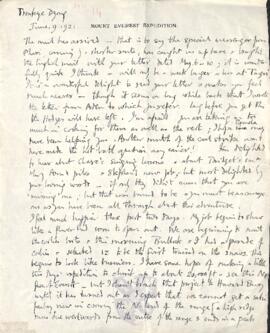
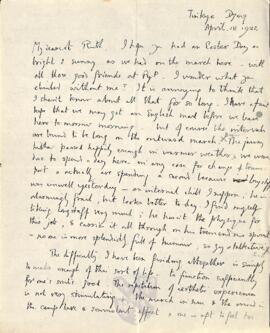
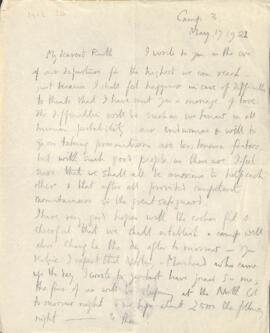
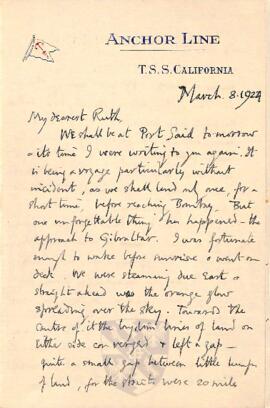
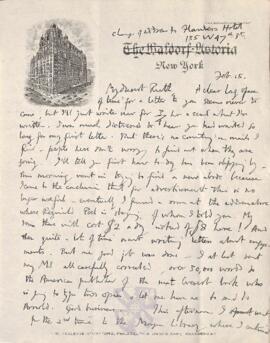
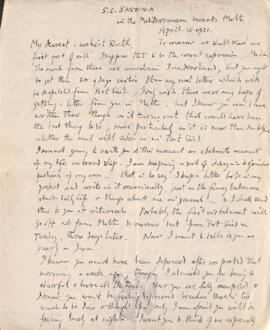

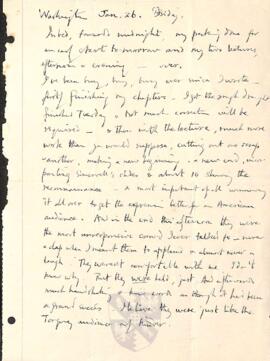
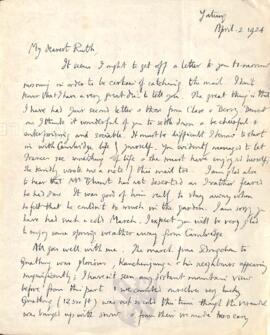
![Letter from George to Ruth Mallory, 22 August 1921 [confirms North Col route to summit]](/uploads/r/null/7/9/4/7947af1191c9f283fdaf014a03d53fc583935670c12d39256ab6598f5573a2b4/PP_GM_3_1_1921_28_watermark_142.jpg)